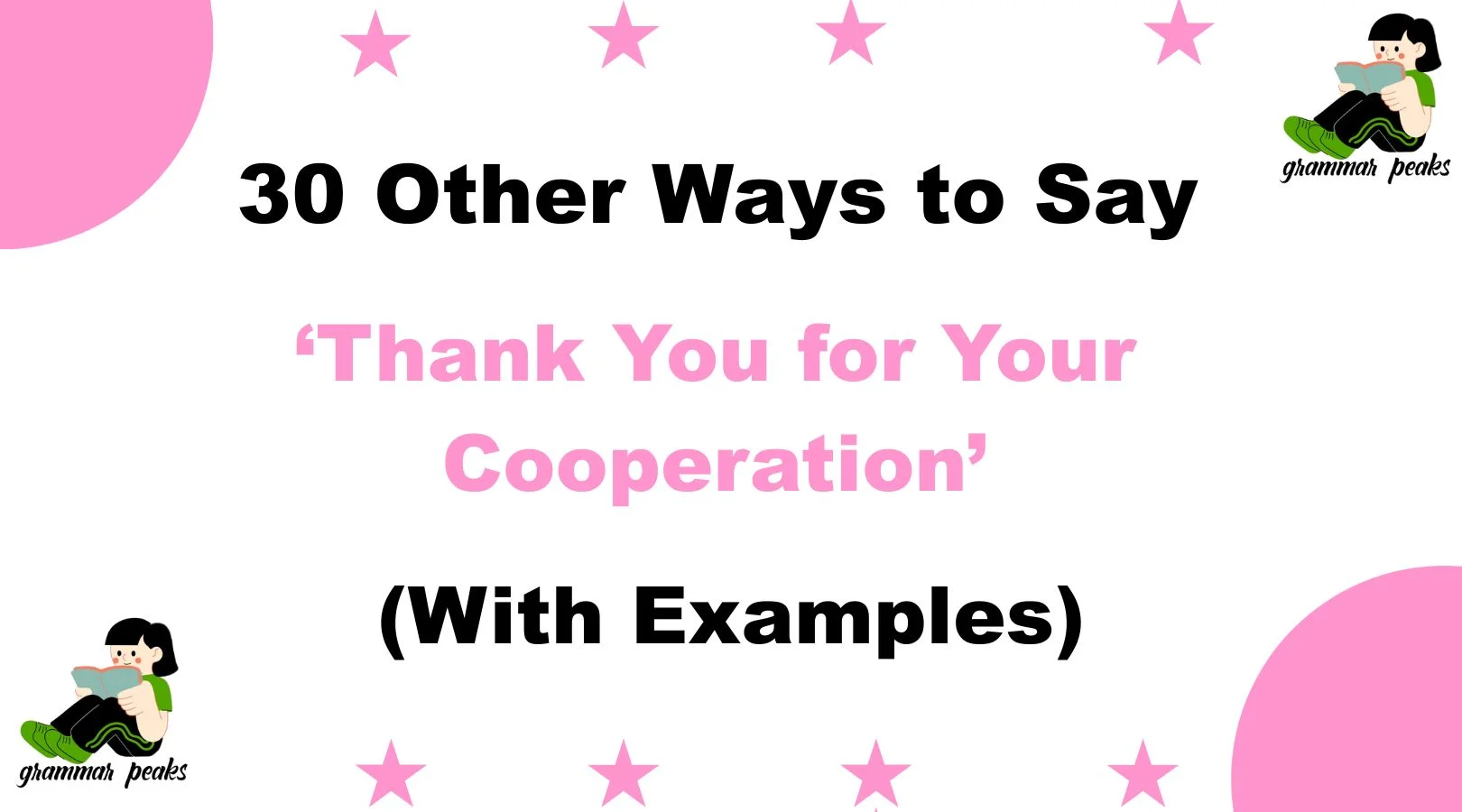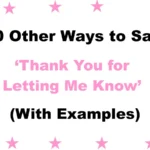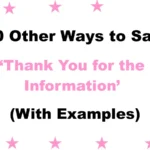Expressing gratitude for someone’s cooperation is an important part of thoughtful communication. Saying “Thank you for your cooperation” is polite and effective, but sometimes you want to make your message feel more personal, warm, or tailored to the situation. Finding the right words helps build stronger connections and shows genuine appreciation for the effort others put in.
Whether you’re writing to colleagues, clients, friends, or family, using different ways to say thank you for cooperation can make your message stand out and resonate more deeply. In this article, you will discover 30 meaningful alternatives that convey gratitude with care, alongside explanations and examples to help you choose the best fit for every context.
What Does “Thank You for Your Cooperation” Mean?
“Thank you for your cooperation” is a polite and formal expression used to acknowledge and appreciate someone’s willingness to assist, follow instructions, or work collaboratively. It implies that the person has either already contributed to a task or is expected to do so in a respectful and supportive way.
This phrase is often used in business, customer service, and academic settings where mutual effort is essential. It shows gratitude without being overly emotional, keeping the tone respectful and professional. Ultimately, it promotes courtesy and a spirit of teamwork.
When to Use “Thank You for Your Cooperation”
Use “Thank you for your cooperation” when you want to show appreciation for someone’s willingness to assist, comply, or collaborate, especially in formal or semi-formal contexts. It’s often used in emails, reports, or requests where a task has been completed or is expected to be followed through.
This phrase is particularly helpful when addressing teams, clients, or individuals during joint projects, troubleshooting, or procedural matters. It helps maintain professional courtesy and mutual respect.
Is It Professional/Polite to Say “Thank You for Your Cooperation”?
Yes, “Thank you for your cooperation” is both professional and polite—especially in formal settings like business emails, client interactions, or team communications. It conveys gratitude while maintaining a respectful tone, making it ideal for workplace correspondence.
However, depending on the context, it can sometimes sound a bit stiff or impersonal, so using a warmer or more personalised alternative can enhance the message. Overall, it remains a widely accepted phrase in professional communication.
Pros and Cons of Using “Thank You for Your Cooperation”
Pros:
- Clearly expresses gratitude
- Suitable in many situations
- Conveys professionalism and respect
Cons:
- Can sound formal or distant if overused
- May feel generic without personalization
Synonyms of “Thank You for Your Cooperation”
- Thanks for your support
- We appreciate your help
- Thank you for your assistance
- Grateful for your collaboration
- Thanks for working with us
- Appreciate your teamwork
- Thank you for your contribution
- Thanks for your understanding
- Thank you for your prompt response
- Much appreciated for your effort
- Thank you for being so helpful
- Appreciate your willingness to assist
- Thanks for your valuable input
- Thank you for your patience and cooperation
- Thanks for your dedication
- Grateful for your partnership
- Thank you for your continued support
- Appreciate your attention to this matter
- Thank you for your commitment
- Thanks for your time and cooperation
- We value your cooperation
- Thanks for your active participation
- Thank you for helping us out
- Appreciate your collaboration on this
- Thanks for being cooperative
- Thank you for your flexibility
- Thanks for your responsiveness
- Grateful for your team effort
- Thank you for your assistance and understanding
- Appreciate your cooperation and support
1. Thanks for your support
Definition: A warm way to express gratitude for someone’s help or backing.
Detailed Explanation: This phrase focuses on the supportive nature of cooperation, emphasizing appreciation for encouragement or assistance.
Scenario Example: After a colleague assists with a project, you say, “Thanks for your support throughout this.”
Best Use: When highlighting encouragement or ongoing help.
Worst Use: Less fitting if the help was very specific or task-oriented.
Tone: Warm, appreciative, and friendly
2. We appreciate your help
Definition: Expresses collective gratitude for assistance received.
Detailed Explanation: The use of “we” makes it inclusive, suitable for team or company messages.
Scenario Example: In a customer service email, “We appreciate your help in resolving this matter.”
Best Use: Formal or semi-formal group communication.
Worst Use: Avoid for individual or casual conversations.
Tone: Professional, respectful, and inclusive
3. Thank you for your assistance
Definition: A formal expression of gratitude for help provided.
Detailed Explanation: Straightforward and clear, this phrase suits official or business contexts well.
Scenario Example: After someone provides technical support, “Thank you for your assistance with the issue.”
Best Use: Formal emails, letters, and professional exchanges.
Worst Use: Too formal for casual chats or friendly notes.
Tone: Formal, respectful, and clear
4. Grateful for your collaboration
Definition: Acknowledges teamwork and joint effort.
Detailed Explanation: Highlights cooperation as a shared process, emphasizing mutual contribution.
Scenario Example: After working together on a project, “We are grateful for your collaboration.”
Best Use: Team projects, partnerships, and joint ventures.
Worst Use: Not ideal when thanking for simple one-time help.
Tone: Professional, warm, and cooperative
5. Thanks for working with us
Definition: Shows appreciation for partnering or cooperating.
Detailed Explanation: Friendly and inclusive, this phrase fosters a sense of teamwork.
Scenario Example: At project completion, “Thanks for working with us to make this a success.”
Best Use: Business partners, clients, or team members.
Worst Use: Avoid very formal communications without rapport.
Tone: Friendly, collaborative, and sincere
6. Appreciate your teamwork
Definition: Recognizes the effort within a team setting.
Detailed Explanation: This phrase praises the cooperative spirit and collective work.
Scenario Example: After a group effort, “We appreciate your teamwork on this assignment.”
Best Use: Team environments, group projects, or collaborative settings.
Worst Use: Too specific for individual assistance.
Tone: Positive, encouraging, and supportive
7. Thank you for your contribution
Definition: Expresses thanks for input or help given.
Detailed Explanation: Suitable for recognizing specific efforts or ideas.
Scenario Example: After receiving ideas in a meeting, “Thank you for your contribution to today’s discussion.”
Best Use: Situations involving ideas, feedback, or active involvement.
Worst Use: Too formal or generic for casual thanks.
Tone: Professional, appreciative, and specific
8. Thanks for your understanding
Definition: Shows gratitude when cooperation involves patience or tolerance.
Detailed Explanation: Useful when the situation requires empathy or acceptance.
Scenario Example: “Thanks for your understanding during the delays.”
Best Use: When cooperation involves accommodating challenges.
Worst Use: Avoid if no understanding or patience is required.
Tone: Polite, empathetic, and thankful
9. Thank you for your prompt response
Definition: Appreciates quick cooperation or reply.
Detailed Explanation: Highlights speed and attentiveness in communication.
Scenario Example: “Thank you for your prompt response to our inquiry.”
Best Use: Email or message replies requiring timely action.
Worst Use: Not relevant if timing is not important.
Tone: Professional, appreciative, and courteous
10. Much appreciated for your effort
Definition: Expresses sincere thanks for someone’s hard work.
Detailed Explanation: Emphasizes the value of effort rather than just the outcome.
Scenario Example: “Much appreciated for your effort on this challenging task.”
Best Use: When recognizing dedication and hard work.
Worst Use: May feel vague if effort wasn’t significant.
Tone: Warm, genuine, and respectful
11. Thank you for being so helpful
Definition: Expresses heartfelt gratitude for someone’s helpful attitude or actions.
Detailed Explanation: Focuses on the person’s willingness and kindness to assist beyond obligation.
Scenario Example: “Thank you for being so helpful during the training session.”
Best Use: Informal to semi-formal situations where warmth is important.
Worst Use: Less suited for very formal or official communications.
Tone: Warm, sincere, and appreciative
12. Appreciate your willingness to assist
Definition: Thanks someone for their readiness to help, even before action is taken.
Detailed Explanation: Highlights the person’s positive attitude and availability to support.
Scenario Example: “We appreciate your willingness to assist with the upcoming project.”
Best Use: When acknowledging eagerness to help.
Worst Use: Avoid if the person did not actually provide help.
Tone: Respectful, positive, and encouraging
13. Thanks for your valuable input
Definition: Recognizes helpful ideas, suggestions, or feedback.
Detailed Explanation: Shows appreciation for contributions that add value to a discussion or project.
Scenario Example: “Thanks for your valuable input during the team meeting.”
Best Use: Professional and collaborative environments.
Worst Use: Not suitable if the input was minimal or unhelpful.
Tone: Professional, respectful, and appreciative
14. Thank you for your patience and cooperation
Definition: Thanks to someone for both their understanding and active participation.
Detailed Explanation: Combines gratitude for tolerance with appreciation for collaborative effort.
Scenario Example: “Thank you for your patience and cooperation as we resolve the issue.”
Best Use: When delays or complications require patience.
Worst Use: Avoid if no patience was needed.
Tone: Polite, empathetic, and grateful
15. Thanks for your dedication
Definition: Acknowledges strong commitment and hard work.
Detailed Explanation: Emphasizes the person’s perseverance and loyalty to the task.
Scenario Example: “Thanks for your dedication to completing the project on time.”
Best Use: Recognizing ongoing commitment and effort.
Worst Use: Too strong for minor or casual help.
Tone: Respectful, admiring, and sincere
16. Grateful for your partnership
Definition: Expresses appreciation for a cooperative relationship or alliance.
Detailed Explanation: Focuses on mutual effort and shared goals in a partnership.
Scenario Example: “We are grateful for your partnership on this business venture.”
Best Use: Business collaborations and joint projects.
Worst Use: Too formal for individual or casual help.
Tone: Professional, warm, and respectful
17. Thank you for your continued support
Definition: Thanks someone for ongoing help or backing.
Detailed Explanation: Appreciates consistent cooperation over time.
Scenario Example: “Thank you for your continued support throughout the campaign.”
Best Use: Long-term collaborations or relationships.
Worst Use: Not relevant for one-time cooperation.
Tone: Appreciative, warm, and encouraging
18. Appreciate your attention to this matter
Definition: Shows gratitude for someone’s focus and care.
Detailed Explanation: Highlights attentiveness and consideration given to a task.
Scenario Example: “We appreciate your attention to this matter and timely action.”
Best Use: Formal communication regarding important issues.
Worst Use: Not fitting for casual conversations.
Tone: Polite, professional, and respectful
19. Thank you for your commitment
Definition: Acknowledges someone’s dedication and responsibility.
Detailed Explanation: Emphasizes reliability and seriousness in cooperation.
Scenario Example: “Thank you for your commitment to the project’s success.”
Best Use: Situations requiring strong dedication.
Worst Use: Avoid if commitment was minimal.
Tone: Respectful, sincere, and formal
20. Thanks for your time and cooperation
Definition: Appreciates both the time spent and the collaborative effort.
Detailed Explanation: Balances recognition of effort with valuing the person’s time.
Scenario Example: “Thanks for your time and cooperation during the review process.”
Best Use: Meetings, reviews, and consultations.
Worst Use: Less suitable if time was not a factor.
Tone: Polite, balanced, and courteous
21. We value your cooperation
Definition: Expresses how much someone’s cooperation is appreciated and respected.
Detailed Explanation: Communicates importance and esteem for the person’s involvement.
Scenario Example: “We value your cooperation in achieving our goals.”
Best Use: Formal business or organizational contexts.
Worst Use: May feel distant or generic in personal settings.
Tone: Professional, respectful, and appreciative
22. Thanks for your active participation
Definition: Thanks someone for engaged and energetic involvement.
Detailed Explanation: Highlights enthusiasm and hands-on contribution.
Scenario Example: “Thanks for your active participation in today’s workshop.”
Best Use: Group events, training, or collaborative activities.
Worst Use: Avoid if participation was passive.
Tone: Encouraging, warm, and positive
23. Thank you for helping us out
Definition: Casual way to express gratitude for assistance.
Detailed Explanation: Friendly and informal, suitable for everyday thanks.
Scenario Example: “Thank you for helping us out with the setup.”
Best Use: Informal or casual help.
Worst Use: Too informal for official communication.
Tone: Friendly, warm, and genuine
24. Appreciate your collaboration on this
Definition: Thanks for working together cooperatively.
Detailed Explanation: Highlights teamwork and joint effort.
Scenario Example: “We appreciate your collaboration on this important project.”
Best Use: Professional teamwork and projects.
Worst Use: Avoid if cooperation was minimal.
Tone: Professional, warm, and appreciative
25. Thanks for being cooperative
Definition: Acknowledges the person’s willingness to cooperate.
Detailed Explanation: Focuses on positive attitude toward collaboration.
Scenario Example: “Thanks for being cooperative during the inspection.”
Best Use: When attitude and behavior matter.
Worst Use: May sound passive-aggressive if overused.
Tone: Polite, neutral, and respectful
26. Thank you for your flexibility
Definition: Appreciates adaptability and willingness to adjust.
Detailed Explanation: Thanks someone for being open to changes.
Scenario Example: “Thank you for your flexibility with the schedule.”
Best Use: Situations with changes or adjustments.
Worst Use: Not suitable if no flexibility was shown.
Tone: Warm, respectful, and grateful
27. Thanks for your responsiveness
Definition: Recognizes quick and effective replies or actions.
Detailed Explanation: Highlights timely communication and cooperation.
Scenario Example: “Thanks for your responsiveness to our questions.”
Best Use: Communication-based tasks or support.
Worst Use: Avoid if timing wasn’t a factor.
Tone: Professional, courteous, and appreciative
28. Grateful for your team effort
Definition: Thanks to a group for collaborative work.
Detailed Explanation: Emphasizes collective contribution and teamwork.
Scenario Example: “We are grateful for your team effort in meeting the deadline.”
Best Use: Group projects and team achievements.
Worst Use: Not suitable for individual thanks.
Tone: Warm, inclusive, and appreciative
29. Thank you for your assistance and understanding
Definition: Expresses gratitude for help combined with patience or empathy.
Detailed Explanation: Useful when cooperation involves support and tolerance.
Scenario Example: “Thank you for your assistance and understanding during this transition.”
Best Use: Challenging or sensitive situations.
Worst Use: Avoid if no understanding was necessary.
Tone: Polite, empathetic, and grateful
30. Appreciate your cooperation and support
Definition: Combines thanks for working together and backing the effort.
Detailed Explanation: Covers both collaboration and encouragement.
Scenario Example: “We appreciate your cooperation and support in this initiative.”
Best Use: Formal and semi-formal communication.
Worst Use: May feel too generic if overused.
Tone: Professional, warm, and respectful
Conclusion
Expressing “Thank you for your cooperation” in different ways allows you to tailor your message with warmth, clarity, and sincerity. Each alternative phrase offers a unique tone and emphasis—whether it’s on teamwork, patience, dedication, or responsiveness. Choosing the right expression depends on your relationship with the recipient and the context of the cooperation.
Thoughtful communication enhances connections and shows genuine appreciation, encouraging continued collaboration. Use these alternatives mindfully to make your gratitude feel more personal and meaningful, creating positive impressions in both professional and personal interactions.
FAQs
1. What does “Thank you for your cooperation” really mean?
It is a polite way to express gratitude for someone’s willingness to work together or comply with requests. It acknowledges that the person has been helpful, supportive, or compliant, especially in situations requiring teamwork or understanding.
2. Is it appropriate to say “Thank you for your cooperation” in professional emails?
Yes, it is a common and professional phrase widely used in business and formal communications. It conveys respect and appreciation while maintaining a polite tone. However, using varied expressions can make your message feel more personalized and engaging.
3. When should I avoid using “Thank you for your cooperation”?
Avoid using it in situations where the other party has not cooperated willingly, or if the phrase might sound insincere or mandatory. In those cases, more specific or empathetic alternatives may be better, like thanking someone for their effort or understanding.
4. Can “Thank you for your cooperation” sound too formal or cold?
Sometimes yes, especially in casual or close relationships. It can come across as formal or even impersonal. Using warmer, more conversational alternatives can help make your message feel friendlier and more heartfelt.
5. How can I make “Thank you for your cooperation” sound more genuine?
Add specific details or personalise the message. For example, mention what you appreciate specifically (“Thank you for your quick responses and cooperation”) or combine it with a friendly tone. Using varied expressions from this article can also help you sound more authentic

Mariah Cannon is a dedicated Senior Content Specialist at GrammarPeaks, known for her clear, engaging writing and deep knowledge of English grammar and usage. With a background in linguistics and years of experience in content development, Mariah crafts informative and accessible articles that empower readers to master the nuances of the English language. Her work reflects a commitment to clarity, education, and helping others express themselves with confidence.





